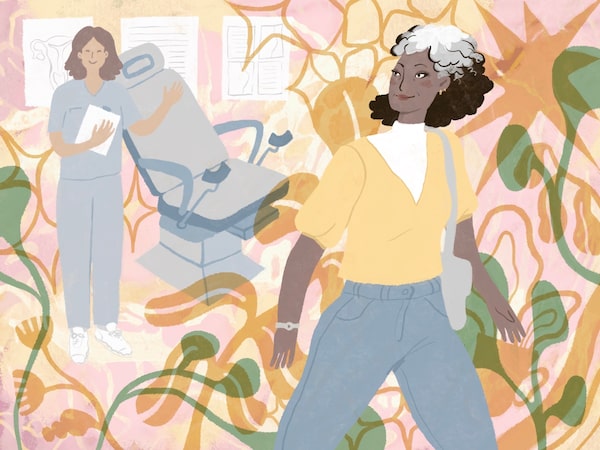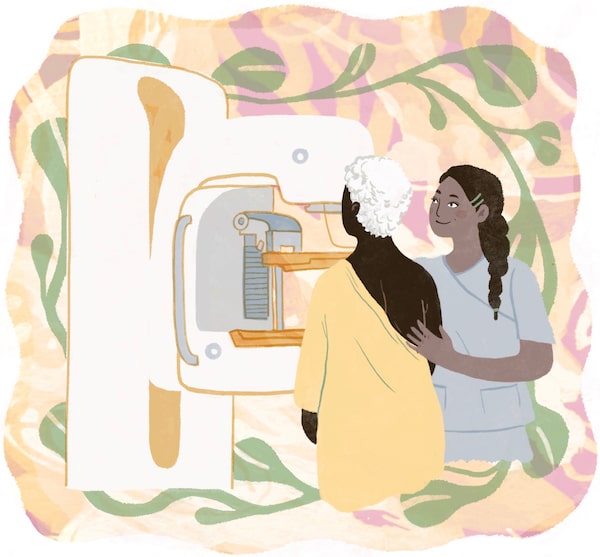
ILLUSTRATION/MAIA GRECCO
Only 25 per cent of Canadian women have been tested for any type of cancer in the past year, and it’s bad for their health, our medical system and the economy
Donna Sheehan, a four-time breast cancer survivor, knows first-hand why women need to stay on top of their cancer screenings.
“In 2020, my annual check-up was scheduled for early March, just when everything was starting to close down. I wasn’t sure if I should go for my appointment because I was nervous about going to the hospital, but thank goodness I did, because there was an abnormality on my screening,” says Sheehan, who is also the founder and executive director of Breast Cancer Support Fund. “I had to do a biopsy and then I was scheduled for surgery.”
Sheehan isn’t the only woman who has faced challenges with her health in the past couple years. In fact, Canadian women are in crisis, according to a new study by Hologic, Inc., a medical technology company focused primarily on women’s health.
The company’s inaugural Hologic Global Women’s Health Index, which is the first study to measure the health of 2.5 billion women and girls around the world, found that Canada ranks a shocking 43 out of 116 countries and territories, trailing Australia (no. 9), the United Kingdom (no. 12) and the United States (no. 26).
Canada’s ranking was pulled down by a few key metrics with Canadian women faring worse than men (and women in other countries) when it comes to mental health. It also found that worry about domestic violence spiked during the pandemic, with 81 per cent of women saying domestic violence is widespread across Canada versus 58 per cent of men.
“The pandemic hasn’t caused all the cracks in our mental health system – it’s revealed them,” says Margaret Eaton, national CEO of the Canadian Mental Health Association. “Even before the pandemic, we know that women experienced depression, anxiety and trauma [in greater numbers] than men across different countries and settings. Supporting and improving women’s mental health should be an urgent priority and the pandemic has just underlined this.”
And the numbers show one particularly troubling area where the effects will reverberate in the coming years: cancer screening. The study found only 24 per cent of Canadian women aged 50 to 74 have been tested for any type of cancer in the past 12 months. If all the eligible women in this age group had gone for the breast and cervical cancer screenings recommended by Health Canada, those numbers would be between 33 and 50 per cent.
There are real-world consequences for these low numbers, Sheehan says, including disastrous effects on their long-term health and well-being, not to mention the healthcare system and even the economy.

ILLUSTRATION/MAIA GRECCO
“Early diagnosis means better outcomes, so catching cancer early saves lives,” she explains. “It also lessens the burden on the health care system. And there’s an economic cost to having cancer for individuals in the healthcare system. About 40 per cent of the patients that we support at the Breast Cancer Support Fund are single mothers, who are often the most financially vulnerable.”
The pandemic is certainly part of the problem. Our healthcare system is stretched thin and, as Sheehan experienced first-hand, it just doesn’t have the capacity to care for everyone, whether someone needs treatment for cancer or their mental health.
“My surgery didn’t take place for months because operating rooms were closed,” she says. “Now things are starting back up slowly, but so many people have fallen through the cracks and it’s going to take a long time to address that backlog.”
What’s more, while women are great at staying on top of their families’ health, their own self-care practices often slip down their to-do lists, says Alison Cowan, medical director, diagnostic solutions at Hologic.
“The fact of the matter is, the pandemic has caused a backlog in cancer screening,” Cowan says. “Equally important, we hear all the time that it is a challenge for our patients to put themselves and their health first. Combining these two factors, it creates a perfect storm that is concerning as a gynecologist, and we have started seeing women with more advanced cancers.”
To Sheehan, the solutions are clear: updated screening guidelines, better public health education and more accurate screening tools. Right now, Canada’s screening guidelines allow people who are under 50 to access screening if they have a family history of cancer, but that only covers about 10 per cent of breast cancer diagnoses.
What’s more, younger women are increasingly being diagnosed with breast cancer, she says, and when they do, it tends to be more aggressive. Education – about the need for screening even if you don’t have a family history of cancer, and the fact that early detection saves lives – is another way governments can help protect women’s health. They also need to invest in better diagnostic tools, something Hologic prioritizes.
“The impact that our technology brings is more accurate screening, limiting further investigation and invasive procedures, therefore increasing women’s wellness and peace of mind,” Cowan says.
Women need to feel empowered to prioritize their health, especially now that health care services are opening back up.
“There is a common understanding that catching cancer early saves lives. I encourage all women to make a screening appointment.” Sheehan says.
Ads-03579-CAN-EN Rev.001 © 2022 Hologic and associated logos are trademarks and/or registered trademarks of Hologic,Inc., and/or its subsidiaries in the United States and/or other countries.
Advertising feature produced by Globe Content Studio with Hologic Inc. The Globe’s editorial department was not involved.